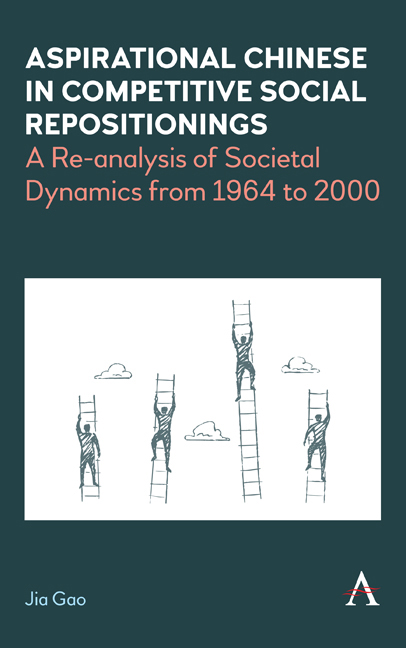 Aspirational Chinese in Competitive Social Repositionings
Aspirational Chinese in Competitive Social Repositionings Book contents
- Frontmatter
- Contents
- List of Abbreviations
- List of Figures
- List of Tables
- Preface and Acknowledgements
- One The Absence of Everyday Chinese in the Dichotomous Paradigm
- Two Rebranding the Communist Heir Narrative and the Cultural Revolution
- Three Tearing the Utopian Veil Down By the Sent-Down Youth
- Four Crying Out for Changes in the Second Half of the 1970s
- Five Battling for the Advantages Under the Dengist Political Alliances
- Six Climbing Different Social Ladders From the Mid-1980s
- Seven Filling in the Post-1989 Vacuum Left By Educated Liberals
- Eight Seizing Chances to Be Entrepreneurial in Post-1992 China
- Nine Towards a Theory of Competitive Social Repositioning
- References
- Index
Nine - Towards a Theory of Competitive Social Repositioning
Published online by Cambridge University Press: 28 February 2024
- Frontmatter
- Contents
- List of Abbreviations
- List of Figures
- List of Tables
- Preface and Acknowledgements
- One The Absence of Everyday Chinese in the Dichotomous Paradigm
- Two Rebranding the Communist Heir Narrative and the Cultural Revolution
- Three Tearing the Utopian Veil Down By the Sent-Down Youth
- Four Crying Out for Changes in the Second Half of the 1970s
- Five Battling for the Advantages Under the Dengist Political Alliances
- Six Climbing Different Social Ladders From the Mid-1980s
- Seven Filling in the Post-1989 Vacuum Left By Educated Liberals
- Eight Seizing Chances to Be Entrepreneurial in Post-1992 China
- Nine Towards a Theory of Competitive Social Repositioning
- References
- Index
Summary
This short chapter concludes this book, with a focus on theoretical insights into how societal dynamics and changes in China's recent past can be better understood and what practical inferences may be drawn from this analysis. As noted in Chapter one, this analysis is conducted from the perspective of competitive social repositioning, some features of which need to be further considered. Special attention must also be paid to the political importance of the Three-Represents theory. This theory was initially put forward by Jiang Zemin in early 2000 as the ideological responses of his leadership generation to the new social class structure, societal dynamics and many other changes taking place in post-Mao China. Two decades after it was proposed, the Three-Represents theory is virtually abandoned by the post-Jiang leadership, despite the occasional, and largely ceremonial, mention in some official media reports. However, it remains not only a conclusion drawn by reformist Chinese leaders from the previous reforming decades, but also a set of ideological and political responses to the main hurdles in modern-ising the CCP from a revolutionary party to a ruling party.
The first section of this final chapter summarises the analysis in earlier discussion chapters and offers further explication of the competitive social repositioning perspective, especially its theoretical and analytical usefulness and importance in examining deep-rooted social dynamics and subsequent social changes. The second section con-siders the practical implications of this study, including a brief analysis of the fate of Jiang Zemin's Three-Represents ideas over the past two decades. Suggestions for future research are offered with the objective of promoting the use of a competitive social repositioning lens in future studies.
Perspective Matters
The three and a half decades from 1964 to 2000, which form the subject of this book, were a historical period when China's economy, people's living conditions and political culture deteriorated to a new crisis level and then started climbing upwards. Specifically, during this period, the Chinese people suffered from the famine of the early 1960s and were then dragged into a decade-long Cultural Revolution. The latter led to widespread support for leaders who had different ideas and governing strategies from Mao, driving China onto the reform track from the late 1970s. Throughout the above social process, a high proportion of Chinese people actively participated in continuous and competitive social repositionings, making the whole country both chaotic and dynamic.
- Type
- Chapter
- Information
- Aspirational Chinese in Competitive Social RepositioningsA Re-Analysis of Societal Dynamics from 1964 to 2000, pp. 191 - 200Publisher: Anthem PressPrint publication year: 2023


